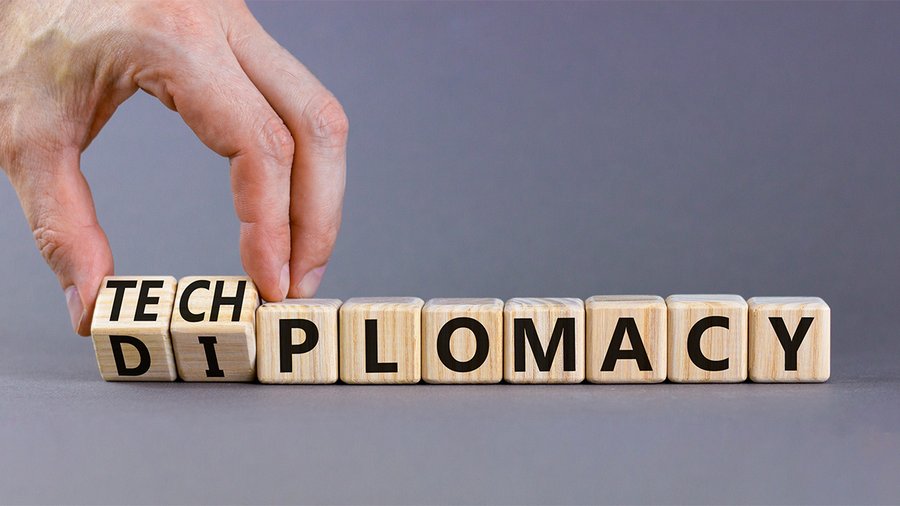"Techplomacy" integrates technology, business, and foreign policy and can help students become effective global citizens
This article was written by Elsa Fredericks, who was an applicant of Salzburg Global’s writing residency program. We are excited to publish her piece, as it is closely aligns with the Salzburg Global Center for Education Transformation's priority areas.
What is "techplomacy"?
“Generative artificial intelligence presents a philosophical and practical challenge on a scale not experienced since the start of the Enlightenment,” stated former US Secretary of State Henry Kissinger, former Google CEO Eric Schmidt, and MIT computer scientist Daniel Huttenlocher in the Wall Street Journal. Their article and best-selling book "The Age of AI" arguably understate the diplomatic challenges that technology increasingly presents, since AI is only one of many critical technologies.
Tech diplomacy is the rapidly developing field integrating the three areas personified by these three authors: namely, foreign policy, business, and technology. I believe that all young global citizens can and should learn the basics of tech diplomacy; the success of this approach can be seen through a unique educational program for students that I developed together with the Tech Diplomacy Network of diplomats from 25 countries.
The first phase of tech diplomacy involved numerous countries, especially from Europe, sending experienced diplomats to Silicon Valley. Denmark sent the first formal “tech ambassador” in 2017 to practice what they called “techplomacy”. Soon, a number of countries realized that their tech diplomacy required not just diplomats but also trade representatives; technology is impacting business and tech companies are becoming global actors. For example, the young Austrian Chancellor Sebastian Kurz already in 2015 launched Open Austria in San Francisco with both career diplomat Martin Rauchbauer and a trade representative as co-directors.
The role of education
It has become painfully clear that inadequate education in technology can handicap effective tech diplomacy. Fluency in the language of technology, often including the “dialects” represented by specific technologies, is simply assumed in Silicon Valley. But senior diplomats often lack this fluency because of their more traditional education and previous roles. The questions asked by American legislators when tech CEOs testify makes the problem embarrassingly clear. Physicist Richard Feynman lamented that people without a basic grounding in physics cannot understand the questions, much less the answers, and this applies equally to technology.
Recognizing the gap, Vienna’s Diplomatische Akademie dedicated its annual Dasicon conference in March 2024 to eight panel discussions related to “digital diplomacy”. The Krach Institute for Tech Diplomacy at Purdue University was created in 2021 and in April 2024, it launched its Tech Diplomacy Academy of online courses on individual technologies, with AI just one of ten. This Institute was founded by former US State Department officials, focusing on the “trust network” required for technology to support freedom rather than authoritarianism. They have donated licenses for their educational courses to the State Department.
On February 21, 2023, diplomats from 25 countries met in San Francisco to formally launch the Tech Diplomacy Network. The first partners of the Tech Diplomacy Network were the World Economic Forum, Diplo, the Bay Area Council, and the Berggruen Institute. The diplomats involved have delivered educational programs at educational institutions like the University of Oxford, Johns Hopkins University, and Vienna’s Diplomatische Akademie. Not coincidentally, Austrian diplomats are among the co-founders, reflecting the country's long diplomatic tradition. The Tech Diplomacy Network is quite complementary to the Krach Institute’s somewhat more US-centric focus on national security.
The "Connected Planet" webinar program
As a high school student myself, I know first-hand that the language of technology is most easily learned by young people, just as with any other language. Alongside the co-founder and the CEO of the Tech Diplomacy Network, we created a webinar program targeted at advanced high school students. This consisted of a series of three webinars titled “Connected Planet”, with each one consisting of a presentation from a Tech Diplomacy Network expert followed by student questions. An introduction to tech diplomacy preceded two sessions on tech diplomacy for climate change and AI respectively.
The program focused on three schools in the district of Marin County, California, and was further publicized by the Tech Diplomacy Network and the Austrian Embassy in Washington. We were overwhelmed by the interest from students, environmental science teachers, and organizations as diverse as a European consulate, a Japanese trade organization, and the Pan African Chamber of Commerce.
This example of a successful webinar program highlights that tech diplomacy education should be available to all students to foster global citizens. The Tech Diplomacy Network is already making the curriculum available free of charge on its website, and we will work with educational partners to continue its development.
The acceleration of technology is truly the critical challenge of our time. Tech diplomacy education for high school and college students is required to help meet that challenge.
Elsa Fredericks is a US/Austrian/German citizen currently studying at Redwood High School in the San Francisco Bay Area while researching education related to tech diplomacy and climate change.
The Salzburg Global Center for Education Transformation offers three writing residencies per year to thought leaders and educationalists working to advance the agenda of education transformation. Our inspiring home at Schloss Leopoldskron provides the time and space for these individuals from across the globe to develop their work and creatively explore new ideas.


